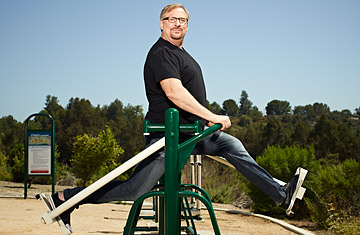
Pastor Power, Warren has lost 55 lb. so far, with 35 to go.
(5 of 6)
Saddleback volunteers traveled to Rwanda and saw that while there were just three large hospitals in one province, there were 869 churches, most of which could do double duty as clinics and care stations. Today 4,000 church-affiliated volunteers have been mobilized in Rwanda, providing screening for HIV/AIDS and hypertension and initiating feeding, clean-water, education and adoption programs. Saddleback is focusing on a dozen other cities around the world — including Amman, Johannesburg, Moscow, Tokyo and Mexico City — for the access they provide to local disadvantaged populations. The Daniel Plan might actually have a role in the PEACE Plan too, since even in desperately poor places, cheap, processed Western-style fare has wreaked havoc on health. "Eighty percent of all diabetics are in the developing world," says Amen. "The commercial used to say, 'I'd like to buy the world a Coke.' Well, I guess we did."
Is It for Everyone?
There's no guarantee that the Daniel Plan, innovative as it is, will move the health needle over the long term. Diet plans have an extraordinary failure rate for a great many reasons. A daunting mix of habit, genetics and even addictive behavior drive obesity, as does simple metabolism: the earlier in life you become fat, the more you change the way you process food.
And yet there's no denying the hand-in-glove way that faith and health mix. People who attend services have a lower risk of dying in any one year than people who don't. Studies have shown that belief in a loving God as opposed to a punishing God is linked to faster recovery postsurgery. People with HIV/AIDS tend to do better when they belong to a religious community. One study even found that church members who give service have better health profiles than those who receive service — confirming that it truly does pay to care for others. The precise mechanism behind these findings — divinity, biology or both — matters less than the fact that the benefits are real.
But the plan could face other obstacles. One of the things that make an evangelical health program so easy to take in nonevangelical communities is Warren's singular style. There's a hint of good-natured mischief to him, which nicely leavens the messages he delivers about such profound issues as life, death and afterlife. He takes an almost teenlike pleasure in talking about his Twitter feed and then adds, "You know, if you don't follow me on Twitter, you'll go to hell."
The line gets the intended laugh, but the fact is, hell does remain part of his teachings. "You have friends who don't know Jesus," he has told his followers. "You know people who are headed to hell." That may be a common evangelical belief, but it fits uneasily with the no-judgments ethos of the Daniel Plan.
The plan's website also makes clear that for all the multicultural character of the program, there is a line that will not be crossed. The Frequently Asked Questions section of the site explains that while doctors of other faiths are part of the plan, they "are helping us as friends," and the church will never compromise its belief that "Jesus is the only way to Heaven or that the Bible is the 100% completely infallible and perfect Word of God."
